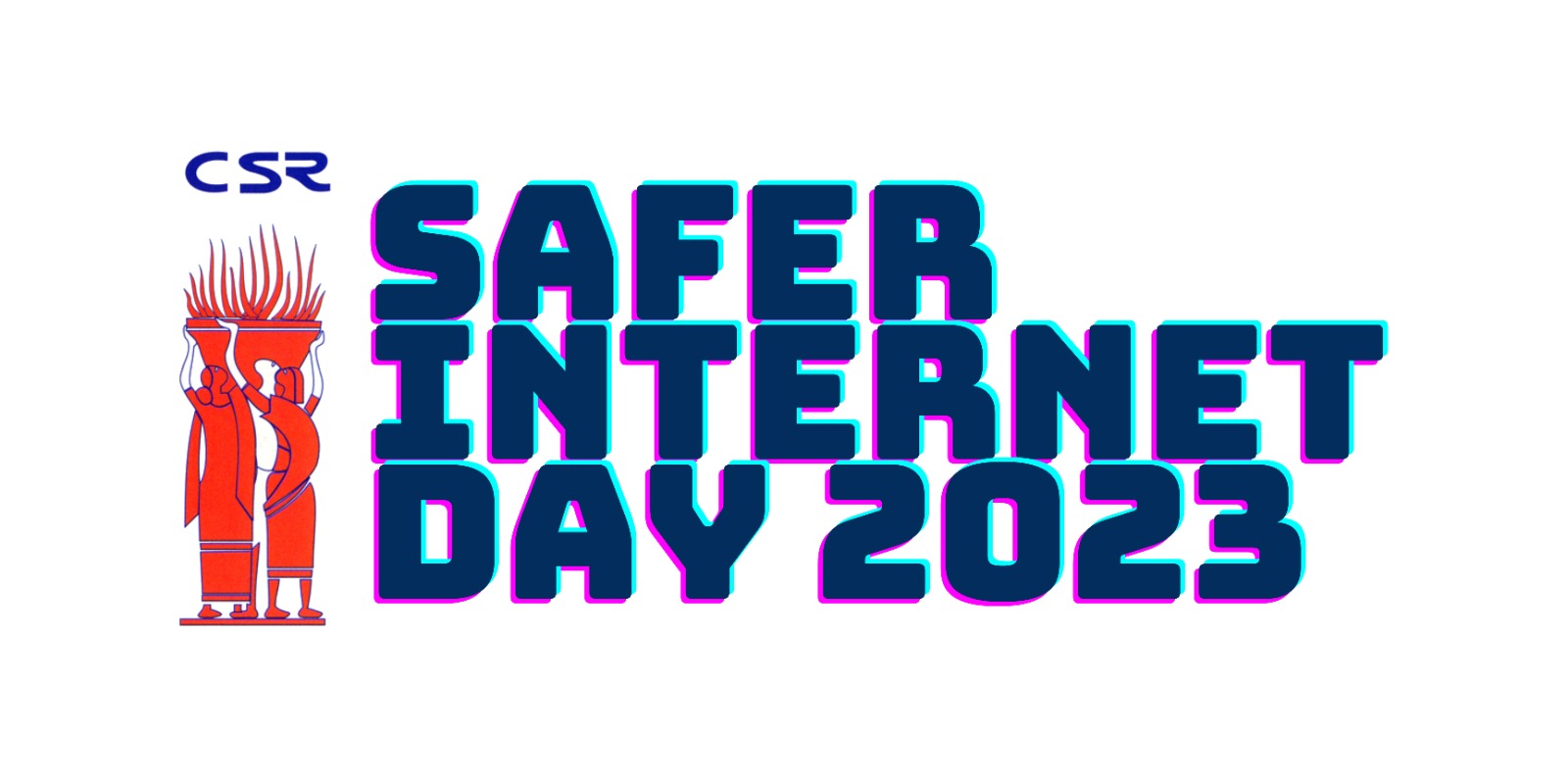

On Safer Internet day CSR wants to talk about a few important aspects of having Positive Experience Online in India.
Unless you are living under a rock for the past few years, we have all heard the phrase ‘Safe Internet’ or ‘Online Safety’. Who does it really affect? The answer is YOU. For over a decade now, the team at CSR has been passionately working to make the internet a safe, secure, and inclusive space for all, especially children and young people as well as women.
We target this cause from various facets. CSR conducts online safety workshops for all stakeholders, with special materials built with the help of experts. We design, build and disseminate educational resources extensively in multiple regional languages. Advocacy with policymakers for a safe online environment is a huge part of our efforts. There have been hundreds of collaborations, media campaigns, special events, roundtables, and discussions over the years.
This year to commemorate Safer Internet Day 2023, CSR is working to educate the women in our community on best practices for internet safety. And here are a few things we want to highlight, based on our experience, on Safer Internet Day 2023:
1. Importance of Awareness: Raising awareness on the dangers and consequences of internet usage is crucial. A Digital Citizenship model of existence online is key. An aware digital citizen is an ideal citizen, not only can he/she keep themselves safe but also save their networks from negative online experiences.
2. Digital Literacy: People need to be educated on safe and responsible internet usage and digital literacy. This encompasses a range of skills including the ability to search, retrieve and analyze information, to communicate and collaborate through digital media, and to understand and create content in different forms and understanding the social, ethical and legal implications of digital technology.
3. Parental Involvement: Parents play a critical role in ensuring the safety of their children online. It is important for parents to stay informed about new technology and trends, and to continue to have open and honest discussions with their children about internet safety. By taking an active role in their children’s online lives, parents can help ensure that they are able to safely and responsibly navigate the digital world and reap the benefits it has to offer.
4. Cyberbullying: Cyberbullying is a growing problem and steps need to be taken to prevent it. Cyberbullying can have serious consequences, both for the victim and the bully. It is important for individuals to understand that cyberbullying is not just a harmless joke or prank, but a form of violence that can have serious and lasting effects. Parents, teachers, and other adults can help prevent cyberbullying by educating themselves and others on the dangers and consequences of this behavior, and by encouraging open and honest communication between children and adults.
Additionally, it is important to report cyberbullying when it occurs, and to support the victim in finding ways to cope and stay safe.
5. Online Predation: Online predators pose a real threat to children and young people and should be taken seriously. The use of the internet by individuals, usually adults, to groom, exploit, or harm minors. It can take many forms, including sexual exploitation, trafficking, and other forms of abuse. Online predators often use social media, chat rooms, and other online platforms to make contact with minors, pretending to be someone they are not and building trust over time.
6. Protecting Personal Information: People need to be educated on how to protect their personal information and avoid falling victim to identity theft and fraud.
7. Appropriate Content for all : Parents and teachers need to be proactive in monitoring the content their children are accessing online and ensuring it is appropriate. Appropriate content typically includes educational materials, games, and videos that are designed specifically for their age group and support their learning and development. It should also be free of violence, sexual content, and other material that could be harmful or inappropriate. For adults, appropriate content can vary widely based on personal preferences and interests, but
should generally be respectful and avoid explicit or harmful material.
8. Appropriate Social Media Usage: Social media can be addictive and harmful if not used responsibly. Appropriate social media usage involves using platforms in a responsible and safe
manner, while respecting others and avoiding harmful or inappropriate behavior. This includes setting clear boundaries and guidelines, being mindful of privacy and personal information, using social media responsibly by avoiding spreading false information or engaging in cyberbullying, and being respectful towards others by avoiding online arguments or engaging in hate speech. It is also important to monitor and manage screen time, and to be aware of the potential negative impacts that social media can have on mental health.
9. Dating online: As India is just waking up to the culture of online dating, we need to be extremely cautious. Be mindful when sharing personal information and avoid meeting in person with strangers. Always inform a trusted friend or family member of your plans.
10. Online gaming : To stay safe while playing online games, it is important to be mindful of online behavior, protect personal information, and be aware of potential risks such as cyberbullying and exposure to inappropriate content. Avoid sharing personal information, including full name, address, phone number, and financial information. Be cautious when communicating with others in the game and report any suspicious behavior. Set boundaries and limits on screen time and be mindful of the amount of time spent playing games. Finally, choose games that are appropriate for your age and are rated by a reputable source.
11. Education Online : To be safe while using the internet for education, it is important to follow best practices for online safety. This includes using a secure network, protecting personal information, verifying the sources of information, being aware of potential risks
12. Fake news and misinformation: Be a critical consumer of information and verify the sources of news and information before sharing it. Be aware of clickbait headlines and be cautious of
information that seems too good to be true. And refrain from forwarding news or information without verifying it first. You can be the break in the chain of fake news.
13. Mental Health : To keep mental health in check while staying online, it is important to set boundaries and limit screen time. Take regular breaks and engage in physical activity, social
interaction, and other offline activities. Be mindful of the content you consume and the amount of time spent on social media. Seek help if you experience symptoms of anxiety, depression, or other mental health conditions related to excessive screen time or internet use. Surround yourself with positive and supportive online communities and seek out trusted sources of information and support. Finally, prioritize self-care and prioritize time for activities that promote well-being, such as sleep, exercise, and hobbies.
14. Addressing Inequalities: Addressing digital inequalities and ensuring access to the internet for all is crucial to promoting internet safety. The internet has become an essential tool for education, work, communication, and personal well-being, but not everyone has equal access to it. Digital inequalities can be caused by a range of factors, including poverty, geography, race, gender and age, and can limit individuals’ ability to participate fully in the digital world. By ensuring access to the internet for all, individuals and communities can reap the benefits it has to offer, including improved education and job opportunities, enhanced communication and access to information, and increased social connectedness. It is crucial to address digital inequalities and ensure that everyone has access to the internet, as this will not only promote internet safety, but also support social and economic development. This can be achieved through government policies, community initiatives, and private sector investments aimed at increasing access to the internet and digital technologies for all.
15. Collaboration: Collaboration between government, industry, civil society and other stakeholders is necessary to effectively address internet safety issues.




